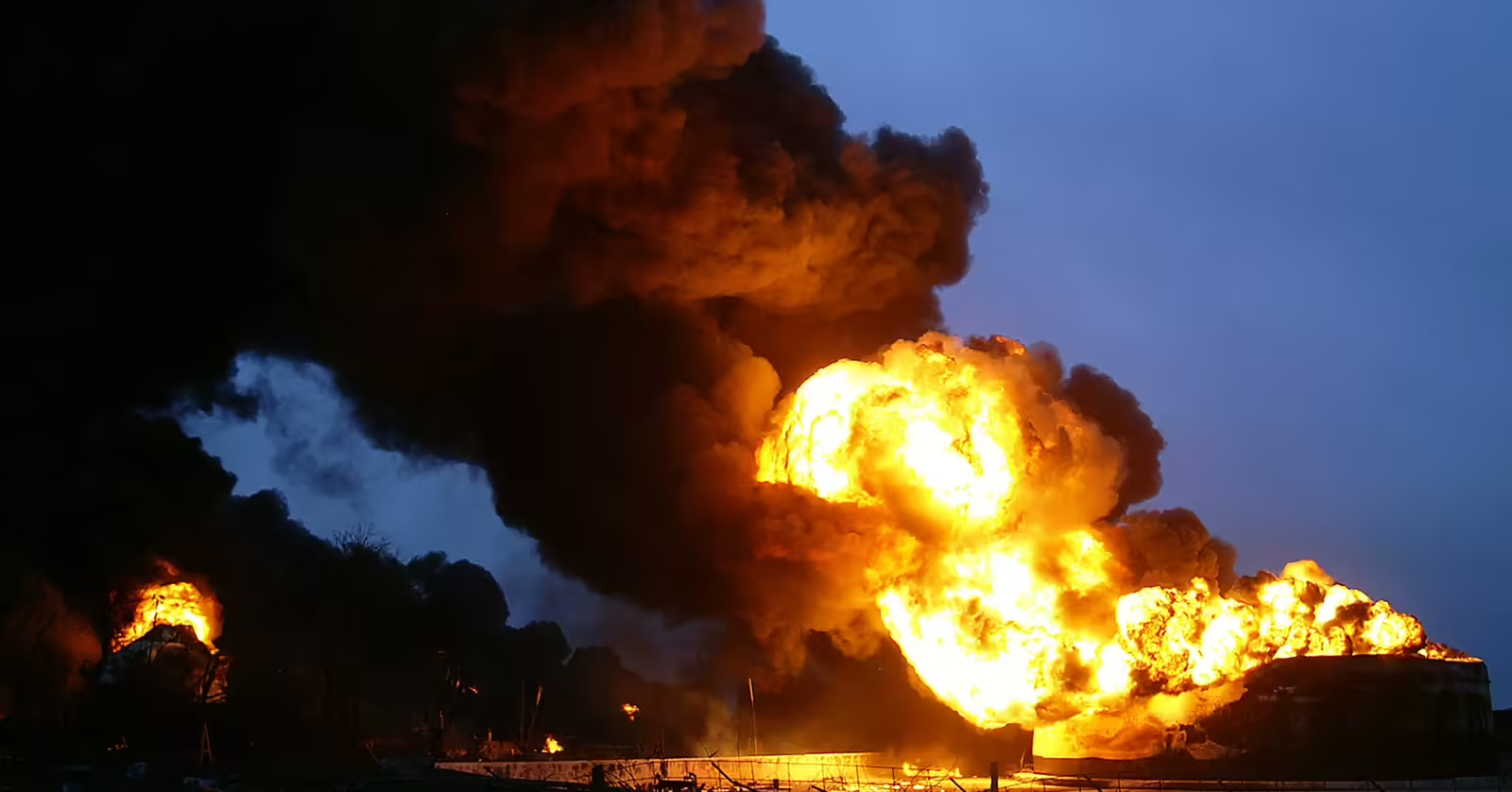Unpacking the Causes of Oil Refinery Explosions
September 1, 2023

Surviving an explosion is no small feat, primarily in a volatile environment like an oil refinery. The devastation can be catastrophic, and the aftermath is challenging to navigate. But knowledge is power. Comprehending the subtleties of these events, from their origins to their outcomes, could mean life or death—or at least help mitigate some of their impacts.
So, what causes an oil refinery explosion (there can be many)?
Causes Behind Refinery Explosions
Adherence to safety protocols is non-negotiable in an oil refinery environment where every action can have serious consequences. Yet breaches in these regulations occur more frequently than you might think, leading to dire outcomes such as explosions. Moreover, instances of human error are alarmingly common contributors to this type of accident. Refineries are complex landscapes of pipes, machinery, and human interaction. When safety takes a backseat in these environments, the stage is set for devastating explosions.
Apathy Towards OSHA Regulations: The first step towards understanding this issue lies in grasping the role of the Occupational Safety and Health Administration (OSHA). They have established stringent guidelines to prevent oil and gas extraction accidents. What happens when these safety measures are disregarded or not implemented correctly? You guessed it – The risk of an explosion escalates dramatically. A typical catalyst leading to oil refinery explosions is disregard for OSHA regulations.
Substandard Safety Programs: Safety is not only about avoiding instant damage; it’s also about cultivating a setting that puts life before cutting corners. Unfortunately, many organizations fall short in this area, with substandard safety protocols increasing risk exponentially.
Prioritizing Profits Over Safety: Why would any company neglect such critical guidelines? Often, profit becomes more important than people’s lives. This negligent attitude violates safety rules and exposes workers to severe injuries from potential explosions resulting from such negligence.
Poor Maintenance Practices: Beyond just ignoring official regulations, though, is overlooking basic precautions that can lead directly to disaster scenarios, including devastating blasts that jeopardize life and property on-site and in surrounding areas. This increases the factors contributing to potentially fatal outcomes overall. Consequently, it is essential to prioritize appropriate precautionary measures to prevent oil refinery explosions. Strictly adhering to safety protocols can help safeguard personnel and surroundings.
Human Error: A phrase that resonates loudly across oil refineries, often resulting in catastrophic explosions. It’s not just an abstract concept but a tangible factor contributing to worker injuries.
Negligent Supervision (The Invisible Catalyst): Poor supervision is a serious issue in industrial environments like refineries. Its role in triggering accidents is often underestimated yet significant.
The invisible hand behind these accidents is typically negligence and subpar safety programs, both products of human shortcomings.
Poor Maintenance & Equipment Safety: When maintenance takes a backseat, refinery equipment integrity becomes compromised, leading to potential disasters. Corrosion—an insidious enemy lurking within metal parts—can trigger leaks that escalate into full-blown explosions if left unchecked.
The impact of inadequate maintenance on equipment safety should be considered. However, industry experts know that neglecting maintenance can significantly catalyze refinery explosions. Without question, maintenance negligence has repeatedly been identified as a primary cause of catastrophic incidents at refineries.”
Maintenance is not just about oiling gears or tightening bolts. A crucial aspect that often goes unnoticed is corrosion management. Corrosion silently eats away at the metal parts used in refinery equipment, gradually weakening their structural integrity. Poorly maintained machinery allows corrosion to go unchecked in many cases. Corroded structures often increase the chances of leaks due to weakened structures. Serious incidents like explosions occur when these corroded parts fail under operational stress conditions in a substantial percentage of cases.
Regular upkeep is critical for preventing incidents like oil refinery explosions. When machinery or systems aren’t properly maintained or equipment is defective due to lackluster quality checks, it’s not just an operational hiccup but potentially a disaster waiting to happen.
Defective Equipment: Defective equipment in a refinery can be more than just an operational nuisance—it’s often the precursor to grave incidents like explosions. Ironically, this machinery, intended to streamline processes and enhance safety, can morph into instruments of disaster.
Faulty Design: A design flaw is no trivial matter regarding equipment operating under extreme conditions such as those found in refineries. An error in blueprint or functionality might seem inconsequential on paper, but it can lead to potential catastrophes when translated into real-world operations.
For example, pressure vessels are integral components designed for containment under high pressures. If these containers lack adequate safety measures due to flawed design, they could fail dramatically when subjected to stresses beyond their limit, resulting in explosive incidents.
Poor Construction: Inadequate construction methods pose equally alarming threats by compromising the durability and reliability of vital machinery. Subpar assembly practices or using inferior materials during construction can severely impair equipment integrity, leading to catastrophic outcomes.
This threat becomes magnified with complex refining machinery, where even minor component failures may rapidly escalate into major accidents, including harrowing personal injury cases arising from explosions.
Faulty designs coupled with poor construction are potent catalysts, turning seemingly innocuous pieces of defective equipment into serious risks within refineries—with implications extending far beyond financial losses, impacting worker safety and process efficiency.
Improperly Stored Chemicals: Moving away from mechanical dangers from defective hardware, another peril lurks within oil refineries: improperly stored chemicals. These silent contributors significantly escalate explosive incidents at these facilities, posing a serious threat to workers and the environment.
Imagine the immense pressure of managing an oil refinery, where a single misstep in chemical storage can ignite a catastrophic explosion. Incorrectly stored chemicals frequently play significant roles in these devastating incidents.
Volatile substances like gasoline and propane magnify the dangers when they are not correctly contained or separated.
In addition to immediate physical threats from explosions, harmful chemical leaks often occur post-incident. These environmental hazards pose serious health risks for those living near facilities or workers involved in cleanup operations.
The chemicals used in refineries require meticulous storage methods for safe operation. If they are mishandled or stored incorrectly, they could become volatile at any moment, causing massive blasts that wreak havoc on lives and property alike.
According to The Houston Chronicle, Texas employs 181,900 people within its oil and gas production sector. Thousands of individuals must stay vigilant about their own safety while performing tasks fraught with potential danger each day.
The Effects of a Refinery Explosion
The devastating aftermath of an oil refinery explosion has far-reaching consequences, impacting human lives and economic stability.
Impact on Workers’ Health: An explosion at a refinery not only shakes the ground, but it also shatters lives. Workers caught in these explosions often suffer from various injuries, including burns and brain injuries. The severe physical trauma can have life-altering consequences for the victims.
However, the damage goes beyond the visible wounds. Survivors of these calamities can often be left with profound mental wounds, such as PTSD, panic issues, and dejection.
Economic Consequences: The ripple effects of an oil refinery explosion extend to our wallets. The property damage caused by these explosions is colossal. According to The Star Tribune, rebuilding costs alone can skyrocket into billions.
Furthermore, major accidents like these can lead to a spike in gas prices. Disruptions in supply chains and production schedules contribute to the increase in prices, affecting consumers at the pump.
Additionally, local economies closely tied to refineries suffer until normal operations can resume. This highlights the harsh reality of the industry sector when safety measures fail.
Legal Recourse for Victims of Oil Refinery Accidents
The aftermath of oil refinery accidents can have severe consequences, burdening victims with high medical bills and lost wages. However, there are viable legal options available to help alleviate these costs.
Navigating Lawsuits and Liability: If negligence or violations of safety protocols were factors in the incident, legal action against those responsible may be feasible.
Potentially liable parties could extend beyond your employer, including equipment manufacturers or third-party contractors whose actions led to unsafe conditions. Having a knowledgeable personal injury attorney by your side is essential in determining who is accountable for these incidents.
The complex nature of refinery operations means many risks are involved, and when something goes wrong, the repercussions can be catastrophic. If you or a loved one has been injured in a refinery explosion, understanding the range of damages you can sue for is essential.
- Medical Expenses
- Emergency room visits
- Surgeries and hospital stays
- Medication
- Physical therapy
- Rehabilitation
- Long-term care for debilitating injuries
- Future medical expenses if ongoing care is needed
- Lost Wages and Lost Earning Capacity
- Wages lost from the time of your injury until trial
- Lost potential to earn income over their lifetime. It’s an assessment of what a person could reasonably be expected to earn, given their skills, education, experience, age, health, and other relevant factors
- Pain and Suffering
- This covers the physical pain and emotional distress a person might undergo due to their injuries. Factors that might be considered include:
- The severity of the injury
- Duration of pain and recovery
- Emotional trauma, including PTSD, anxiety, and depression
- This covers the physical pain and emotional distress a person might undergo due to their injuries. Factors that might be considered include:
- Mental Anguish
- Psychological pain, distress, or emotional suffering that a person experiences may not necessarily be linked to physical harm. While physical injuries can be seen and objectively measured, mental anguish is subjective and can manifest in various ways depending on the individual. Some common manifestations or symptoms of mental anguish include:
- Depression or feelings of hopelessness
- Anxiety or excessive worry
- Shame or humiliation
- Sleep disturbances or nightmares
- Severe emotional distress or mood swings
- Post-traumatic stress disorder (PTSD)
- Fear
- Grief or intense sorrow
- Psychological pain, distress, or emotional suffering that a person experiences may not necessarily be linked to physical harm. While physical injuries can be seen and objectively measured, mental anguish is subjective and can manifest in various ways depending on the individual. Some common manifestations or symptoms of mental anguish include:
- Wrongful Death
- In the unfortunate event that a refinery explosion results in the loss of life, the deceased’s family may sue for damages, including:
- Funeral and burial expenses
- Loss of financial support
- Loss of companionship, care, or guidance
- In the unfortunate event that a refinery explosion results in the loss of life, the deceased’s family may sue for damages, including:
- Punitive Damages
- Punitive damages are awarded in certain legal cases to punish and deter particularly egregious or malicious wrongdoing. These are intended not as compensation but as a punishment to deter similar future behavior.
The cause of an oil refinery explosion can vary, but common triggers include safety violations, human error, poor maintenance practices, defective equipment, and improperly stored chemicals. Workers at the site are often victims of such explosions. However, bystanders or residents living near the facility may also sustain injuries due to flying debris or subsequent fires. Injuries from refinery explosions range widely in severity – they can be minor cuts and bruises to life-threatening conditions like burns or brain trauma. Apart from immediate physical injuries, survivors might experience post-traumatic stress disorder (PTSD), chronic respiratory issues due to smoke inhalation, and potential exposure to toxic substances.
Oil refinery explosions are devastating realities, often resulting from safety violations and human error. Poor maintenance and defective equipment also contribute to these incidents. Improperly stored chemicals can further exacerbate the risks, creating a ticking time bomb.
The aftermath of these explosions has far-reaching consequences. It impacts workers’ health, causes economic ripples, and leaves behind a trail of destruction. Severe injuries such as burns or brain injuries are not uncommon. Additionally, the costs to rebuild damaged refineries can be astronomical.
If you or a loved one has been tragically affected by a refinery explosion, it’s essential to recognize the profound impact this can have on your life. Such catastrophic events are not just about the immediate physical injuries but the long-term emotional, psychological, and financial repercussions that can last a lifetime.
Get Started With Your Injury Claim
Refinery explosions are complicated. Determining fault requires understanding intricate industry regulations, safety standards, and the potential negligence involved. While nothing can reverse the trauma, securing fair compensation is crucial in the healing process. Don’t leave your fate in the hands of anyone but the best. We are here to assist you in understanding your legal options. We will use every legal means to hold those responsible parties accountable and provide the guidance and support you need. Let us help you get back on track after surviving the blast. Call the attorneys at Morrow & Sheppard, LLP today at (800) 489-2216. The refinery explosion lawyers at Morrow & Sheppard possess the knowledge and resources to thoroughly investigate and navigate this complexity on your behalf. We will work to maximize your compensation. With medical bills piling up, potential lost wages, and intangible damages like pain, suffering, and mental anguish, you deserve every penny of compensation.
Our attorneys know how to present your case in a way that reflects the true extent of your losses. We will deal with the big refinery and their army of lawyers. Refineries and their insurance companies often have vast resources and legal teams dedicated to minimizing their liability. Facing them alone is a monumental task. Hiring the refinery explosion lawyers at Morrow & Sheppard ensures you’re not outmaneuvered or pressured into settling for less than you deserve. In this trying period, your focus should be on healing and recovery. Let us be your advocate, help shoulder the burden, and work to give you the space and opportunity to rebuild your life.
Daniel Sheppard is licensed to practice personal injury law in Texas and Louisiana. Daniel takes pride in providing exceptional service to clients who were seriously hurt on the job and brings his relentless work ethic into the office and the courtroom. Learn more about Daniel.
- Home
- |
- Wrongful Death
- |
- Unpacking the Causes of Oil...
















































